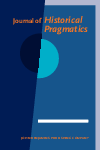
Journal of Historical Pragmatics
Scope & Guideline
Innovating Research at the Crossroads of Linguistics and History
Introduction
Aims and Scopes
- Historical Politeness and Social Interaction:
The journal frequently addresses the evolution of politeness norms across different historical periods and cultures, examining how social interactions are shaped by language. - Corpus-based Pragmatic Analysis:
It employs corpus linguistics methodologies to analyze historical texts, providing insights into language change, usage patterns, and pragmatic functions. - Diachronic Studies of Language Change:
A significant focus is placed on diachronic analysis, exploring the historical development of linguistic features, including syntax, semantics, and discourse markers. - Interdisciplinary Approaches:
The journal integrates perspectives from sociology, anthropology, and cultural studies, allowing for a multifaceted understanding of language in historical contexts. - Focus on Diverse Languages and Cultures:
While primarily focused on European languages, the journal also includes studies on non-European languages, enhancing its scope and inclusivity.
Trending and Emerging
- Diachronic Pragmatics in Political Contexts:
An increasing number of studies explore the pragmatics of language in historical political discourse, highlighting how language shapes and reflects power dynamics and societal changes. - Women’s Voices and Gendered Language:
Research focusing on women's contributions to historical discourse and the pragmatics of gendered language is gaining traction, emphasizing the importance of diverse perspectives in historical analysis. - Pragmatic Functions of Literary Texts:
There is a growing trend in analyzing the pragmatic aspects of historical literary texts, particularly in understanding authorial intent and audience reception. - Cultural and Social Dimensions of Language Change:
Emerging studies highlight the interplay between language, culture, and social practices, indicating a shift towards understanding language as a socially embedded phenomenon. - Cross-Linguistic Comparisons of Pragmatic Features:
Research that compares pragmatic features across different languages and historical contexts is increasingly popular, reflecting a broader interest in universality and variation in language use.
Declining or Waning
- Narrowly Defined Historical Linguistics:
Research strictly limited to historical linguistics without consideration for pragmatic contexts has become less frequent, as the journal increasingly emphasizes the integration of pragmatics. - Traditional Politeness Theories:
Older frameworks of politeness that do not incorporate recent sociolinguistic insights are appearing less often, indicating a move towards more contemporary and context-sensitive approaches. - Static Analyses of Language:
Studies that focus on static snapshots of language use in historical texts are declining in favor of dynamic analyses that consider language change over time. - Regional Language Studies:
While the journal has published on various regional languages, there seems to be a waning interest in studies that do not connect to broader theoretical implications or cross-linguistic comparisons.
Similar Journals
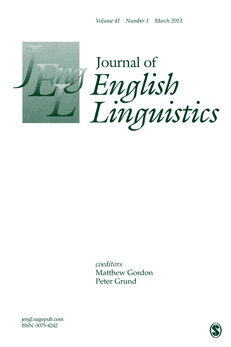
JOURNAL OF ENGLISH LINGUISTICS
Connecting Researchers to the Heart of Linguistic StudyJOURNAL OF ENGLISH LINGUISTICS, published by SAGE PUBLICATIONS INC in the United Kingdom, is a premier scholarly journal dedicated to advancing the field of linguistics through a rigorous exploration of the English language. With its ISSN 0075-4242 and E-ISSN 1552-5457, this quarterly journal boasts an impressive impact factor and maintains a notable standing within the academic community, evidenced by its Q1 ranking in Linguistics and Language. Its rich history, covering publications from 1967 to 2024, ensures that it remains an essential resource for researchers, professionals, and students alike, fostering critical discourse and innovative research in English linguistics. While the journal is not open access, it offers a wealth of valuable insights and cutting-edge findings that are vital for anyone interested in understanding the complexities of language structure, usage, and evolution. For those seeking to stay at the forefront of linguistic scholarship, JOURNAL OF ENGLISH LINGUISTICS represents an indispensable cornerstone in the field.
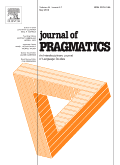
JOURNAL OF PRAGMATICS
Illuminating the Nuances of Pragmatic InteractionJournal of Pragmatics, published by Elsevier, is a premier interdisciplinary journal dedicated to the exploration of language use as a dynamic social phenomenon. Established in 1977 and set to continue through 2024, it serves as a vital resource for researchers across various fields, including Artificial Intelligence, Linguistics, and Language Studies. With an impressive Q1 ranking in Linguistics and Language and a Q2 ranking in Artificial Intelligence, the journal has made significant contributions, supporting a diverse range of theoretical and empirical research. It boasts a solid reputation, evidenced by its strong positions in Scopus rankings—occupying the 91st percentile among the best in the Social Sciences and 92nd in Arts and Humanities. Although it does not currently offer open access, the Journal of Pragmatics remains essential for professionals and scholars seeking to deepen their understanding of pragmatics and its applications in language technology, societal interaction, and cognitive processes. With its international reach and high standards, this journal is a cornerstone for anyone dedicated to advancing knowledge in the fields of language and communication.
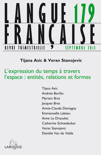
LANGUE FRANCAISE
Illuminating the Pathways of French Linguistic ThoughtLANGUE FRANCAISE, published by LAROUSSE, stands as a premier journal in the realm of linguistics and language studies, boasting an impressive Q1 quartile rating in the 2023 Linguistics and Language category. With its international reputation anchored in France, this journal presents critical research and discussions that advance our understanding of the French language, its structures, usage, and evolution. Although not an open-access publication, LANGUE FRANCAISE is indexed with an ISSN of 0023-8368 and an E-ISSN of 1957-7982, reflecting its scholarly credibility and impact, including Scopus rankings that place it competitively in the fields of arts and humanities as well as social sciences. This journal serves as an essential resource for researchers, practitioners, and students aiming to deepen their knowledge and engage in scholarly debates that shape contemporary linguistic thought. The journal's commitment to high-quality research continues to foster an enriching academic environment and contribute to the dynamic discourse surrounding language and linguistics.

Fluminensia
Cultivating Critical Discourse in the HumanitiesFluminensia, published by the University of Rijeka, Faculty of Philosophy, is a distinguished open-access journal that has been contributing to the fields of Linguistics and Literature since its inception in 1999. With an ISSN of 0353-4642 and an E-ISSN of 1848-9680, this journal offers rigorous peer-reviewed articles, fostering an engaging platform for researchers, professionals, and students alike. Recognized internationally, it holds a Q3 ranking in Linguistics and Language and a Q2 ranking in Literature and Literary Theory for 2023, reflecting its significant impact within these fields. Based in Croatia and serving a global academic community, Fluminensia aims to explore innovative theories and methodologies, promoting critical discourse and scholarly exchange. Researchers will find its broad scope inviting, bridging insights across various disciplines in the arts and humanities. Accessible to all, this journal continues to foster an inclusive academic landscape, ensuring that valuable research is widely disseminated and freely available.

Verba-Anuario Galego de Filoloxia
Elevating Philological Studies with Quality ScholarshipVerba-Anuario Galego de Filoloxia is a prominent academic journal published by UNIV SANTIAGO COMPOSTELA, dedicated to advancing the field of linguistics and language studies. Hailing from Spain, this journal provides a vital platform for researchers, educators, and students interested in Galician philology and its broader linguistic implications. Although it operates under traditional access models, the journal’s commitment to quality research is reflected in its categorization within Q3 in Linguistics and Language for 2023, showcasing its significant contributions to the field. Encompassing a convergence period from 2017 to 2024, Verba garners attention in both the Arts and Humanities and Social Sciences domains, with its Scopus rankings highlighting its moderate impact within these categories. By nurturing scholarly dialogue and disseminating innovative studies, Verba-Anuario Galego de Filoloxia plays a crucial role in promoting linguistic research, making it an essential resource for professionals and academic institutions striving to explore the complexities of language and philology.

Studii de Lingvistica
Navigating the complexities of language and thought.Studii de Lingvistica is a premier open-access journal committed to advancing the field of linguistics and language studies since its inception in 2011. Published by EDITURA UNIV ORADEA in Romania, this scholarly platform aims to disseminate high-quality research that encompasses various aspects of linguistics, encouraging contributions from researchers and professionals worldwide. With an impact factor that reflects its relevance, the journal holds a prestigious position in the Q2 category of Linguistics and Language for 2023. Despite its relatively nascent H-index, Studii de Lingvistica has carved a niche for itself, ranking 1017th and 1094th in Scopus across Arts and Humanities and Social Sciences, respectively. Researchers, scholars, and students alike will find valuable insights and pioneering studies within its pages, making it a vital resource for those engaged in the nuanced exploration of language and its cognitive dimensions. Located at UNIVERSITATII ST NO 1, PAVILION C, ORADEA, BIHOR, ROMANIA, this journal continues to foster academic dialogue and innovation within the linguistics community.
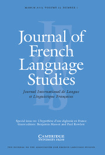
Journal of French Language Studies
Advancing the Frontiers of French LinguisticsJournal of French Language Studies, published by Cambridge University Press, is a prestigious and leading journal in the field of linguistics and language that provides a platform for scholarly articles and research findings relevant to the French language and its various dimensions. With an impressive Q1 ranking in the 2023 categorization and ranked #257 out of 1088 in Scopus for Language and Linguistics, this journal plays a pivotal role in advancing the study of French linguistic methodologies, sociolinguistics, and applied linguistics. Since its inception in 1991, the journal has continually contributed to the academic community, attracting innovative investigations and theoretical discussions that enrich understanding and research in the field. Researchers and students enjoy comprehensive access to critical analysis and emerging trends, and as it continues to converge towards 2024, the journal promises to remain an essential resource for exploring the evolving landscape of French language studies.

Contrastive Pragmatics
Unveiling the power of pragmatics in communication.Contrastive Pragmatics, published by BRILL, is a premier open-access journal dedicated to advancing the field of linguistics through a unique focus on the pragmatic aspects of language comparison and contrast. Since its inception in 2020, this journal has rapidly established itself as a vital resource for scholars interested in the intricate interplay between language use, culture, and communication, reflecting the increasing importance of pragmatics in understanding cross-linguistic phenomena. With its Q2 ranking in Linguistics and Language as of 2023, and its commendable positions within Scopus ranks, Contrastive Pragmatics offers a platform for innovative research that not only highlights theoretical developments but also invites empirical investigations across languages and cultures. The journal's commitment to open access ensures that cutting-edge research is freely available, fostering collaboration and knowledge sharing among researchers, professionals, and students alike. For those looking to stay at the forefront of linguistic research, Contrastive Pragmatics is an essential avenue for exploration.
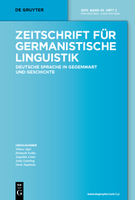
ZEITSCHRIFT FUR GERMANISTISCHE LINGUISTIK
Fostering Scholarly Excellence in German StudiesZEITSCHRIFT FUR GERMANISTISCHE LINGUISTIK, published by WALTER DE GRUYTER GMBH, stands as a pivotal resource in the field of linguistics since its inception in 1973. With its ISSN 0301-3294 and E-ISSN 1613-0626, this esteemed journal serves as an essential platform for researchers and academics focused on the nuances of the German language and its linguistic frameworks. Catering to a diverse audience, the journal features high-impact articles and contributions consistent with rigorous academic standards, as evident from its Q1 categorization in Linguistics and Language and its notable rankings in both the Arts and Humanities and Social Sciences domains. The journal's commitment to advancing knowledge in linguistics fosters a scholarly environment conducive to both emerging and established linguists. While not available through open access, ZEITSCHRIFT FUR GERMANISTISCHE LINGUISTIK remains influential, drawing readers keen on exploring developmental and educational paradigms alongside linguistic theories. With a convergence of research that spans until 2024, it represents a comprehensive body of work integral to the evolving landscape of linguistic studies in Germany and beyond.
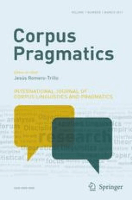
Corpus Pragmatics
Innovating Linguistic Research with Computational PerspectivesCorpus Pragmatics is an esteemed academic journal published by SpringerNature, focusing on the interdisciplinary field of linguistics and its applications within the realms of computer science and social sciences. With a strong foundation since its inception in 2017, the journal has made significant strides, earning recognition with a Q2 rating in Linguistics and Language and a Q3 in Computer Science Applications as of 2023. The journal's impressive Scopus rankings highlight its impact, placing it in the 86th percentile among language and linguistics journals. Corpus Pragmatics aims to bridge the gap between empirical research and theoretical insights, fostering an environment that promotes innovative approaches to understanding the complexities of language use in a digital age. As an open-access platform, it provides researchers, professionals, and students with invaluable resources to enhance their work and engage with the latest findings in the field. With a commitment to quality and relevance, Corpus Pragmatics stands out as a vital resource for advancing knowledge in linguistics and its computational applications, making significant contributions to both academia and industry.